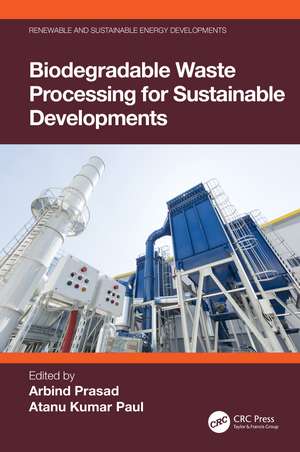Biodegradable Waste Processing for Sustainable Developments: Renewable and Sustainable Energy Developments
Editat de Arbind Prasad, Atanu Kumar Paulen Limba Engleză Hardback – 7 aug 2024
This book:
- Discusses the environmental impact of waste-to-energy and sustainable waste-to-energy technologies in a comprehensive manner.
- Presents life cycle assessment studies and perspective solutions in waste-to-energy sectors.
- Covers applications of smart materials in thermal energy storage systems.
- Explains thermo-chemical technologies for recycling plastic waste for energy production and recovery of valuable products.
- Illustrates biorefineries and case studies for sustainable waste valorization.
Preț: 1122.62 lei
Preț vechi: 1369.04 lei
-18% Nou
Puncte Express: 1684
Preț estimativ în valută:
214.84€ • 221.94$ • 178.80£
214.84€ • 221.94$ • 178.80£
Carte tipărită la comandă
Livrare economică 25 martie-08 aprilie
Preluare comenzi: 021 569.72.76
Specificații
ISBN-13: 9781032667553
ISBN-10: 1032667559
Pagini: 368
Ilustrații: 134
Dimensiuni: 156 x 234 mm
Greutate: 0.69 kg
Ediția:1
Editura: CRC Press
Colecția CRC Press
Seria Renewable and Sustainable Energy Developments
Locul publicării:Boca Raton, United States
ISBN-10: 1032667559
Pagini: 368
Ilustrații: 134
Dimensiuni: 156 x 234 mm
Greutate: 0.69 kg
Ediția:1
Editura: CRC Press
Colecția CRC Press
Seria Renewable and Sustainable Energy Developments
Locul publicării:Boca Raton, United States
Public țintă
Academic, Postgraduate, and Undergraduate AdvancedCuprins
1. Introduction to Bioenergy and Waste to Energy. 2. Waste to Bioenergy: A Sustainable Solution. 3. Environmental impact of waste to energy. 4. Strategic Approach to Biomass Energy Production: Feasibility, Challenges, and Opportunities. 5. Plastic Recycling for Energy Production. 6. A study on waste management practices in Oman and a way forward to a circular economy. 7. Sustainable Waste to Energy Technologies: Fermentation. 8. Environmental Aspects of Food Waste to Energy Conversion. 9. Biorefineries for Sustainable Waste Valorization. 10. Microbial Fuel Cells (MFCs) for Waste Recycling and Energy Production. 11. Industrial Organic Waste to Energy. 12. Valorization of algal blooms and their residues into renewable energy. 13. Recycling of biopolymers. 14. Plastic Recycling for Energy Production. 15. Current and perspective solutions in waste to energy sector.
Notă biografică
Arbind Prasad has completed his Ph.D. (Mechanical Engineering) from the Indian Institute of Technology Guwahati, Assam, India. He has also earned the gold medal in his M. Tech. He is currently working as an Assistant Professor and Head (Mechanical Engineering) in the Department of Science, Technology and Technical Education, Government of Bihar, at Katihar Engineering College, Katihar, Bihar, India.
Atanu Kumar Paul received his M. Tech. in Chemical Engineering from National Institute of Technology Durgapur (West Bengal) and his Ph.D. in Chemical Engineering from Indian Institute of Technology Guwahati, Assam, India. He has published numerous articles in reputable national and international journals, books, and conference proceedings. He has a lot of experience organising workshops and seminars. He is currently employed by the National Institute of Technology Andhra Pradesh, Tadepalligudem, Andhra Pradesh, India, as an assistant professor in the Department of Chemical Engineering.
Atanu Kumar Paul received his M. Tech. in Chemical Engineering from National Institute of Technology Durgapur (West Bengal) and his Ph.D. in Chemical Engineering from Indian Institute of Technology Guwahati, Assam, India. He has published numerous articles in reputable national and international journals, books, and conference proceedings. He has a lot of experience organising workshops and seminars. He is currently employed by the National Institute of Technology Andhra Pradesh, Tadepalligudem, Andhra Pradesh, India, as an assistant professor in the Department of Chemical Engineering.
Descriere
The text comprehensively highlights the key issues surrounding the implementation of waste-to-energy systems, such as site selection, regulatory aspects, financial, and economic implications.
